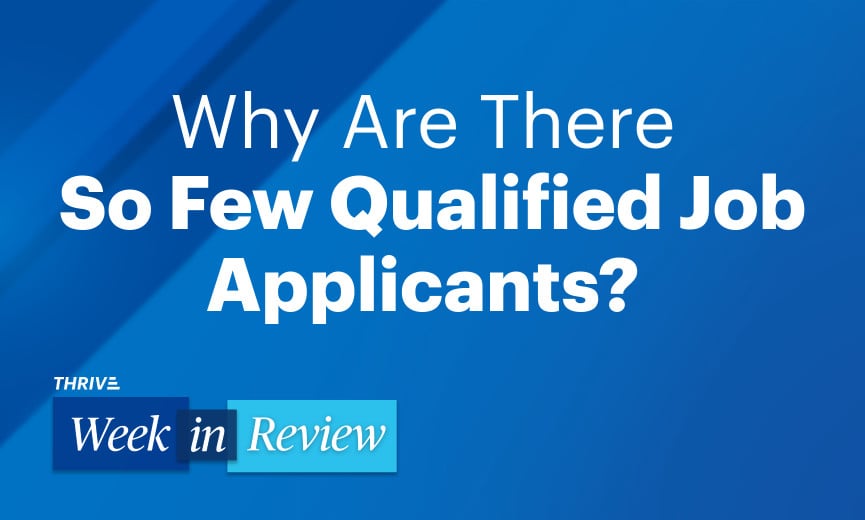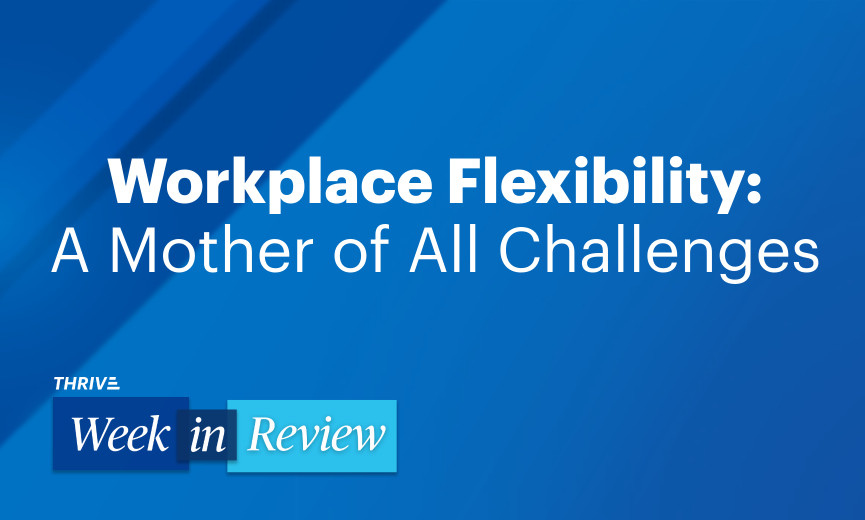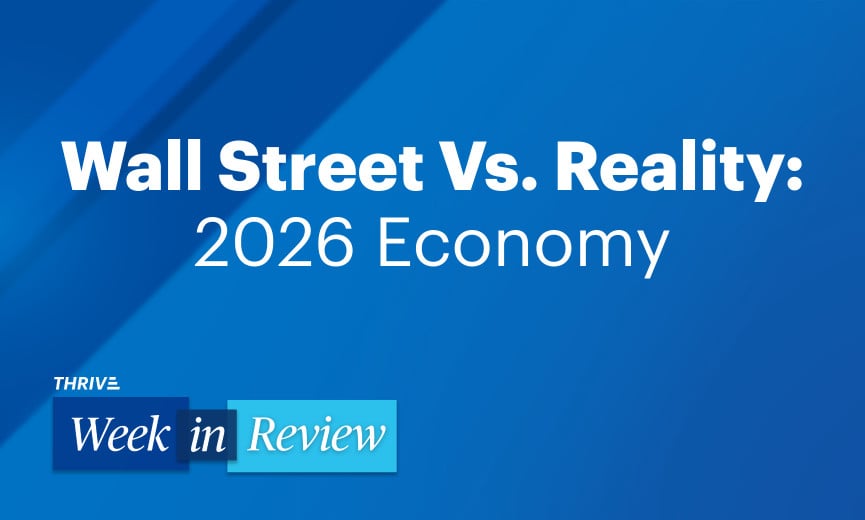- Thrive
-
Season
4Episode140
CA Minimum Wage Hike (sort of), Portal Connects Fund Sources, and Inflation is Bananas

Podcast •

Summary
California increases its minimum wage, but exemptions made for franchise owners of major fast-food restaurants within larger facilities such as airports. It just went into effect April 1 and already there are complaints. Gene Marks shares his thoughts on this, as well as why he agrees with Bank of America’s efforts to consolidate funding resources to help businesses with limited access. And don’t miss why a 21% increase on the price of a particular item is just bananas. Check out the podcast.
View Transcript
[Gene Marks, host]
Hey, everybody, this is Gene Marks, and welcome to this week's episode of the Paychex THRIVE Week in Review. Thank you so much for joining me this week.
By the way, if you haven't already, go and sign up for our Paychex newsletter, our THRIVE newsletter at paychex.com/thrive. We have lots of advice, tips to help to run your small business, as well as links to past episodes of this podcast. It will be a valuable addition to your reading materials. Go and subscribe at paycheck.com/thrive.
So okay, for those of you guys that know this podcast, I pick three items in the news that that impacts our small businesses and offer some thoughts. So, let's go first to California.
This week, a new law is taking effect, according to the Associated Press. Most fast-food workers in California will be paid at least $20 an hour beginning this week. The Democrats in the state legislature passed the law last year as part of an acknowledgment that many of the more than half a million people who work in fast food restaurants are not teenagers, but adults working to support their families. The law applies to restaurants offering limited or no table service and are part of a national chain with at least 60 establishments nationwide.
Restaurants operating inside a grocery establishment are exempt, as our restaurants producing and selling bread as a standalone menu item. So, this really affects people, mostly franchisors, you know, that are operating national chains; McDonald's, Wendy's, Burger King, whatnot, what have you. These are the franchises; they're going to have to pay their people $20 an hour.
The law was supported by the trade association representing fast-food franchise owners, but since it passed, many of them have bemoaned the impact. For example, according to the Associated Press, one owner of 10 Auntie Annie's Pretzels and Cinnabon restaurants in the San Francisco Bay Area said he will have to raise prices 5 to 15% at his stores and is no longer hiring or seeking to open new locations. Over the past decade, California has doubled its minimum wage for most workers to $16 an hour.
So, if you are a franchisor and you are working, you own businesses in California, in the fast-food industry, you're looking at paying a minimum $20 an hour to your employees. Lots of debate whether or not this is a good thing for workers, whether it causes unemployment, whether the costs are passed through to consumers in the end.
More importantly, though, is to watch how this measure does in the state of California, because if it does see some level of success and there isn't that much of a pushback to it over the next, I don't know, give it another year or two, I'm betting that some other states might be doing the same thing. Whether or not to target specific industries, that's up for debate, if that's a good idea. But California's doing this, and this might be something that is going to impact your state and even your business some day in the future.
News from Bank of America. This is reported in a press release that they issued. They are launching an online platform that connects small-business owners with Community Development Financial Institutions or CDFIs. These are financial institutions that are geared towards giving out low-cost or easily more easily accessible loans to people in urban areas, for the most part. Capital One's connector is called the Access to Capital Connector. It enables small-business applicants to answer questions to become pre-qualified and then connected with platform participants to best meet their needs.
More than 150 CDFIs and other support organizations are participating on the platform. They're offering capital and other resources for small businesses. The platform is created in collaboration with the Community Reinvestment Fund, a nonprofit CDFI and longtime Bank of America partner. According to Patrick Davis – he’s the Senior VP of Platform Technology Services at CRF, the Community Reinvestment Fund – he says when small businesses have access to responsible capital and other resources, they create jobs, grow wealth, and provide critical services to communities.
Sharon Miller, who's the president of Small Business at Bank of America, said in that same press release, “Thousands of small businesses each year fail to get financing because they lack the connections, resources, and funding to continue operating through this long-standing partnership. We aim to make connections stronger between startups, entrepreneurs, and funding partners to fuel new ideas and economic value.”
I like this, and there is, by the way, been a trend towards more not just online banking, but open banking. The idea is you go to a platform like this one from Bank of America, you submit your details once and then it becomes available to a bunch of different types of financials and financial institutions. That's a good thing, I think, for businesses. Rather than having to go and apply to 150 different community development financial institutions, you can just apply once and there 150 can look at your application and you can be matched to what works and makes the best sense for you.
So, it's a trend called open banking. I like it. I think it's a good idea and I think it will help mostly small businesses, startups, and small entrepreneurs. It's a good way to access capital.
Finally, bad news from Trader Joe's, as reported on CNN, they have increased the price of their bananas this past week. It used to be $0.19 to get a banana at Trader Joe's. Now, it's $0.23. Now, I know that doesn't sound a lot, but it's a 21% price hike, and this is from a company that for years has stood against raising prices, have done absolutely everything possible to not raise prices.
By the way, Trader Joe's does sell bananas individually, not by the package, in case you've never been there. According to Trader Joe's spokesman, "We only change our prices when our costs change, and after holding our price for bananas at $0.19 each for more than two decades, we've now reached a point where this change is necessary.”
There is a lot of good news there, by the way. There are some items that Trader Joe's have actually reduced prices, like raw almonds and romaine hearts and organic tricolor bell peppers and green onions. So, you know, that is good. But the bottom line is, is that inflation is – when Trader Joe's is raising prices on items – you know that inflation is definitely taking a toll. So, if you're feeling the pinch of inflation and you're a small-business man, you are not alone.
My name is Gene Marks. You've been listening to the Paychex THRIVE Week in Review podcast. Again, if you would like some help and tips to run your business, subscribe to our Paychex THRIVE newsletter at paychex.com/thrive.
Thanks so much for listening. We will be back to you next week with a few items in the news that affect your business and how that affects you. Look forward to talking with you then. Take care.
This podcast is property of Paychex, Inc. 2024. All rights reserved.

 Apple Podcast
Apple Podcast Spotify
Spotify iHeartRadio
iHeartRadio








